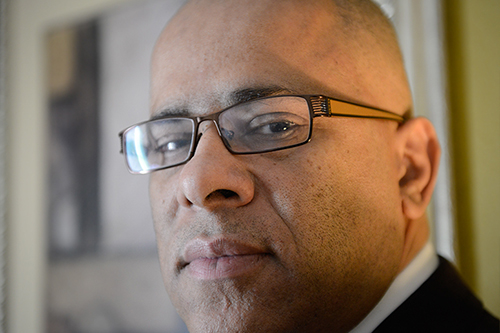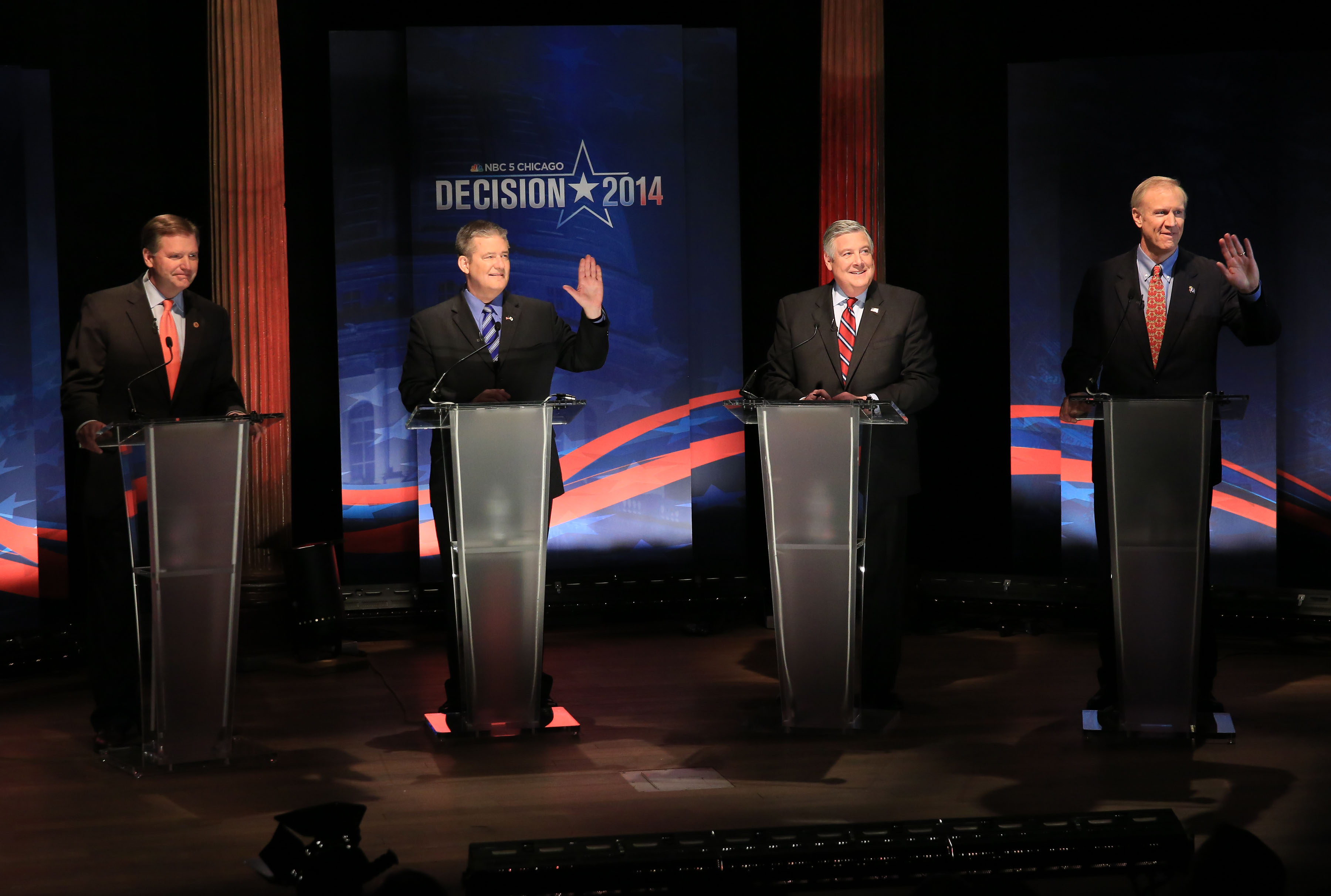

Editor’s note: This episode of the Curious City podcast includes a story about what the candidates for Illinois governor think about the state’s new concealed-carry law. It starts 6 minutes, 30 seconds into the program. (Subscribe via iTunes or Feedburner!) This topic was also discussed on WBEZ’s The Afternoon Shift.
Cheryl Brumbaugh-Cayford of Elgin, Ill., had a perception about guns and violence that made her curious about the crop of primary candidates vying to be the state’s governor. Her suspicion? The more that people carry guns in public, the higher the likelihood of gun violence.
With this highly-debated viewpoint in hand, she sent Curious City this question, just in time for the March 18 primary:
What would the candidates for Illinois governor do to prevent gun violence once thousands of residents are granted concealed carry permits?
There’s a lot to unpack here, including some basic information about the state’s concealed carry law.
First, Illinois was the last state in the country to adopt concealed carry and, even then, the lawmakers didn’t act on their own; they were forced to pass a bill — any bill — by a federal judge who had ruled it’s unconstitutional to not allow people to carry concealed guns in public. The legislature approved such a bill in May 2013.
The timing’s not lost on Cheryl, who tells us she once appreciated that Illinois had not allowed concealed carry, and she feels the policy was foisted on the state.
But now, she said, “The way our elected officials respond is going to be crucial.”
Cheryl’s onto something here. The first few thousand applicants have just begun receiving their concealed carry permits from the Illinois State Police. That means that — between the primary and November’s general election — state residents will have a better idea of what living in a state with concealed carry really feels like.
And there may be pressure, one way or another, to rework the policy.
So how would the candidates respond?
To the best of our ability, we let the candidates themselves speak to this. But since several of them cite studies about the relationship between violence, crime and concealed carry policy, we also compared their statements to what’s being said about concealed carry by academics. While answering Cheryl’s question, we found the bottom line is that the lack of consensus among the candidates is pretty much reflected by a lack of consensus in the research.
Good guy gun ownership, bad guy gun ownership
So what effect do concealed carry laws have on violence? It’s important to tease out because politicians often cite research to back their positions. And — as you’ll read and hear below — the academic findings run the gamut..
(A clarification: Cheryl asked about positions related to concealed carry and violence. Researchers we reached out to look at violent crime, but other types of crime, as well.)

“The fact that a would-be victim might be able to defend themselves also deters crime,” Lott said in a phone interview with WBEZ.
Lott’s research of municipal crime data from across the country suggests crime drops after concealed carry laws take effect, and the more concealed carry permits that are issued, the more it drops.
“You know, all sorts of claims about ‘Bad things are gonna happen, you know, blood in the streets?” he said. “A year from now, everybody’s gonna say, ‘What was this debate all about?’”
That’s particularly true for Illinois, Lott said, because strict requirements on obtaining a concealed carry permit may limit the number of people who get them.
But here’s where things get a little complex, if not outright confusing.
John Donohue, a professor at Stanford, has also studied the effects of concealed carry laws on crime rates, and his research suggests the exact opposite of what Lott found.
“If I had to bet my house, I’d say more likely that they have adverse impacts than that they have a beneficial impact,” Donohue said, adding the caveat that the current available research models aren’t perfect.
Still, Donohue said he’s doing preliminary work with a new research model that suggests right-to-carry laws lead to more aggravated assaults.

And then there’s a third position held by other researchers about what happens to crime rates in right-to-carry states, as expressed by Prof. Gary Kleck from Florida State University.
“Other things being equal, nothing happens,” Kleck said. “Good guy gun ownership has crime-reducing effects and bad guy gun ownership has crime-elevating effects.”
The reason there are so many contradictory opinions is that none of these folks can agree on what data they should be looking at or how they should be looking at it. Kleck said this gets into differences over the minutiae of crime research models.
“There may be only one right way to do it, but there’s like a million different wrong ways to do it. And yeah, if you’re a layperson, you’re just ‘Joe Regular Guy’ trying to figure it out, you’re doomed,” Kleck said. “I mean, there’s nothing I can say to help you out because you’re not gonna be qualified to see those … flaws in the research.”

Where the candidates stand
All this is to show that concealed carry is a complicated, controversial issue. But we wanted to illustrate that even among the experts — the folks whom politicians are citing — there’s not a consensus.
We posed Cheryl’s question to all six major party campaigns, but we had to track down responses in very different ways. In three cases we were able to ask candidates directly, either at press conferences or via phone calls. For the others, we had to search for answers through other avenues. In some cases, we extrapolated a position based on the candidate’s previous statements on concealed carry, crime, violence and guns.
Democrat Tio Hardiman
He is the only candidate who acknowledged the conflicting research that we encountered.
“I cannot penalize, not with a good conscience, penalize legal gun owners for the violence problem in Illinois. There’s no data to back it up. So if people would like to exercise their right to the Second Amendment, they should be able to do so.”
Republican State Sen. Bill Brady
“We also have to understand that this is about public safety and driving down crime. We know that in every state where concealed carry took place, crime went down. And we need to give our citizens the opportunity to protect themselves and watch crime go down.”
Republican State Sen. Kirk Dillard
“Illinois is the last state in America to allow people to protect themselves. It took the 7th Circuit Court of Appeals to force the state of Illinois to allow people to have the same right they had in all 49 other states, let alone keep the criminals guessing. I take a wait and see approach. I think we ought to wait and see how this law unfurls for a while before we make any changes, pro or con, to it.”
Republican businessman Bruce Rauner
We didn’t get a direct response from Bruce Rauner, but he addressed themes in Cheryl’s question during a debate.
“I think concealed carry was long overdue. Gun ownership is an important constitutional right. We should end the approach that many politicians take in Illinois and that is to blame our crime problems on gun ownership. Our crime problems are one of, crimes about inadequate police staffing, high unemployment and horrible schools, not about gun ownership.”
Republican State Treasurer Dan Rutherford
In previous statements, including this one from a debate in northwest suburban Hoffman Estates, he’s said he wants the Illinois State Police to oversee gun licenses efficiently.
“If I was king of the forest or if I was the governor and I was able to help influence it, it would be a different bill than what it was. I think what we need to be very, very sensitive to, though, is the evolution of this. The evolution could be, as you suggested, perhaps making it better and more enhancing. But as well an evolution could also put us backwards if we don’t have the right people in the governor’s office, we don’t have the right people in the General Assembly. One of the performance reviews that I will be doing is with regards to State Police. Why does it take so long to process a FOID card? Why does it take so long to process the application for your concealed carry? Those are unacceptable.”
Democratic incumbent Gov. Pat Quinn
The governor didn’t seem to like any part of the process of negotiating the concealed carry bill last year, and he vetoed parts of it in the name of safety. Those changes were overridden by the General Assembly.
“This is about public safety. I think that public safety should never be compromised, never be negotiated away. The governor, that’s me, my job is to protect public safety and I think that’s what I’m doing here with these common sense changes. I think we need to repeat that over and over again. The things I’ve outlined today that have changed this bill are all about common sense and public safety and I think the General Assembly and the members should put aside politics and focus on people and their safety.”
Tony Arnold covers Illinois politics for WBEZ. Follow him @tonyjarnold. Alex Keefe is a political reporter at WBEZ. You can follow him on Twitter and Google+.
This report received additional support through Front & Center, an occasional WBEZ series funded by The Joyce Foundation.


